Analysis of Airbnb's Impact on Lisbon's Housing Market
VerifiedAdded on 2022/11/29
|10
|2619
|260
Report
AI Summary
This report delves into the effects of Airbnb, buy-to-let investments, and tourism on Lisbon's housing market, focusing on the central area of Alphama. The study, conducted between 2015 and 2017, examines the short-term rental issues, including how Airbnb investments affect the native population. The research challenges the notion of a sharing economy, highlighting buy-to-let investments where various entities profit from tourism. The paper argues that Airbnb contributes to financial housing issues and provides hyper-flexible rental markets that increase insecurity and displacement. The methodology includes fieldwork, interviews with residents, real estate agents, and property managers. Findings reveal a surge in tourism and real estate investment, resulting in housing rehabilitation and increased rental prices, coupled with lower wages, contributing to a housing crisis for locals. The discussion emphasizes the need for regulation and policy changes to address the social and spatial effects of short-term rentals, including reversing tenancy insecurity and reforming fiscal frameworks. The conclusion stresses the dominance of Airbnb in public debates and the need to prioritize housing as shelter rather than an investment vehicle.

Assessment 1
Paraphrase This Document
Need a fresh take? Get an instant paraphrase of this document with our AI Paraphraser


Table of Contents
⊘ This is a preview!⊘
Do you want full access?
Subscribe today to unlock all pages.

Trusted by 1+ million students worldwide
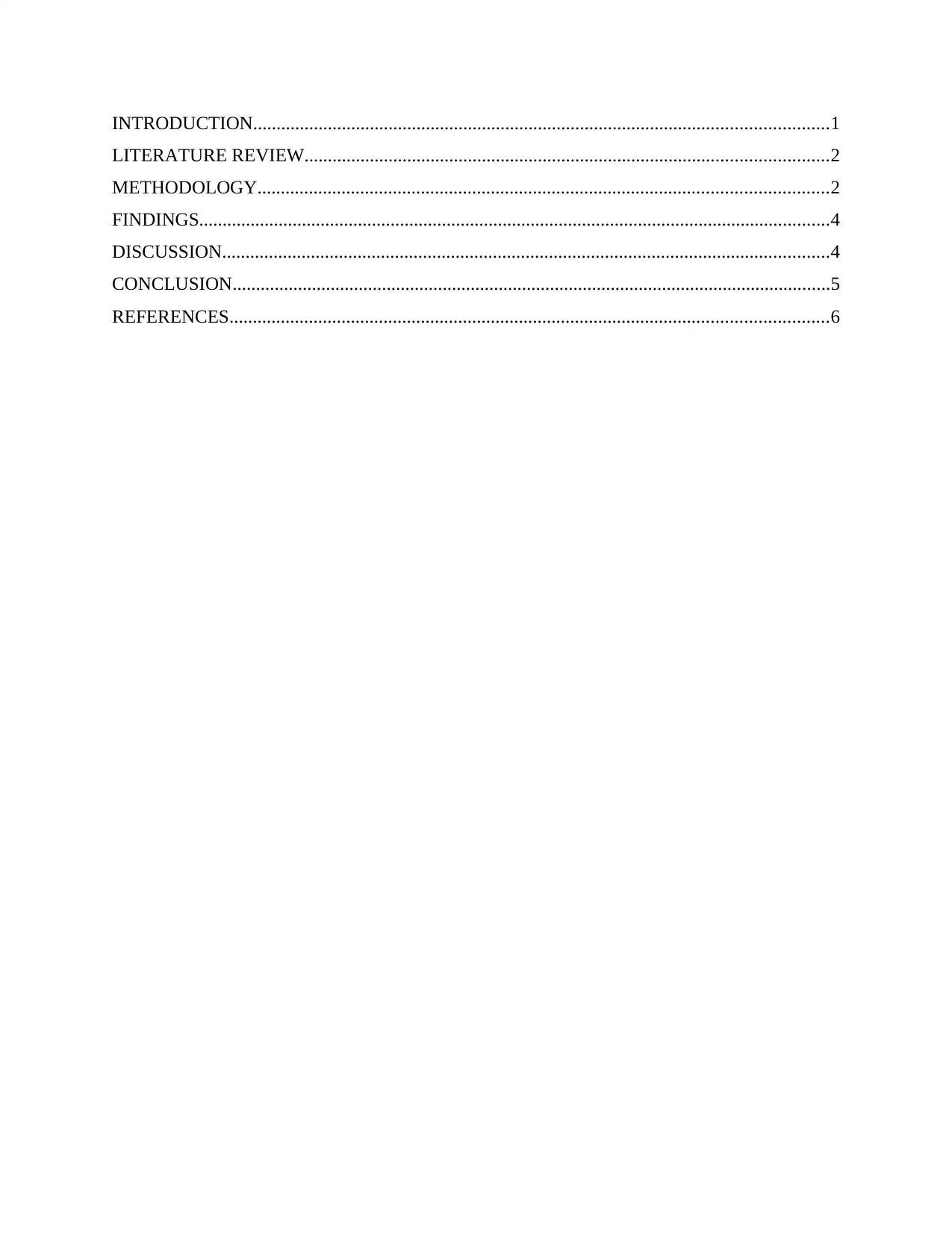
INTRODUCTION...........................................................................................................................1
LITERATURE REVIEW................................................................................................................2
METHODOLOGY..........................................................................................................................2
FINDINGS.......................................................................................................................................4
DISCUSSION..................................................................................................................................4
CONCLUSION................................................................................................................................5
REFERENCES................................................................................................................................6
LITERATURE REVIEW................................................................................................................2
METHODOLOGY..........................................................................................................................2
FINDINGS.......................................................................................................................................4
DISCUSSION..................................................................................................................................4
CONCLUSION................................................................................................................................5
REFERENCES................................................................................................................................6
Paraphrase This Document
Need a fresh take? Get an instant paraphrase of this document with our AI Paraphraser
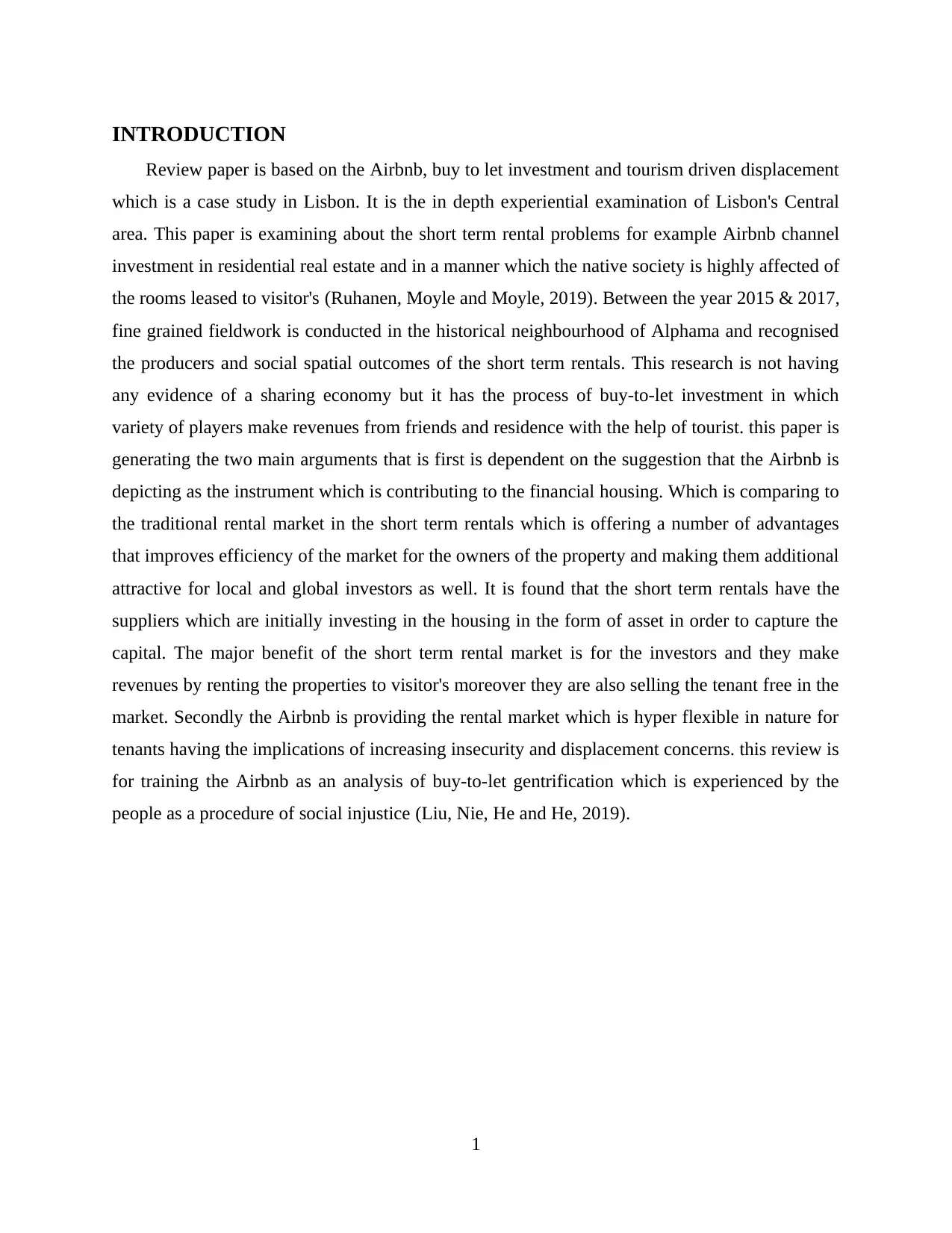
INTRODUCTION
Review paper is based on the Airbnb, buy to let investment and tourism driven displacement
which is a case study in Lisbon. It is the in depth experiential examination of Lisbon's Central
area. This paper is examining about the short term rental problems for example Airbnb channel
investment in residential real estate and in a manner which the native society is highly affected of
the rooms leased to visitor's (Ruhanen, Moyle and Moyle, 2019). Between the year 2015 & 2017,
fine grained fieldwork is conducted in the historical neighbourhood of Alphama and recognised
the producers and social spatial outcomes of the short term rentals. This research is not having
any evidence of a sharing economy but it has the process of buy-to-let investment in which
variety of players make revenues from friends and residence with the help of tourist. this paper is
generating the two main arguments that is first is dependent on the suggestion that the Airbnb is
depicting as the instrument which is contributing to the financial housing. Which is comparing to
the traditional rental market in the short term rentals which is offering a number of advantages
that improves efficiency of the market for the owners of the property and making them additional
attractive for local and global investors as well. It is found that the short term rentals have the
suppliers which are initially investing in the housing in the form of asset in order to capture the
capital. The major benefit of the short term rental market is for the investors and they make
revenues by renting the properties to visitor's moreover they are also selling the tenant free in the
market. Secondly the Airbnb is providing the rental market which is hyper flexible in nature for
tenants having the implications of increasing insecurity and displacement concerns. this review is
for training the Airbnb as an analysis of buy-to-let gentrification which is experienced by the
people as a procedure of social injustice (Liu, Nie, He and He, 2019).
1
Review paper is based on the Airbnb, buy to let investment and tourism driven displacement
which is a case study in Lisbon. It is the in depth experiential examination of Lisbon's Central
area. This paper is examining about the short term rental problems for example Airbnb channel
investment in residential real estate and in a manner which the native society is highly affected of
the rooms leased to visitor's (Ruhanen, Moyle and Moyle, 2019). Between the year 2015 & 2017,
fine grained fieldwork is conducted in the historical neighbourhood of Alphama and recognised
the producers and social spatial outcomes of the short term rentals. This research is not having
any evidence of a sharing economy but it has the process of buy-to-let investment in which
variety of players make revenues from friends and residence with the help of tourist. this paper is
generating the two main arguments that is first is dependent on the suggestion that the Airbnb is
depicting as the instrument which is contributing to the financial housing. Which is comparing to
the traditional rental market in the short term rentals which is offering a number of advantages
that improves efficiency of the market for the owners of the property and making them additional
attractive for local and global investors as well. It is found that the short term rentals have the
suppliers which are initially investing in the housing in the form of asset in order to capture the
capital. The major benefit of the short term rental market is for the investors and they make
revenues by renting the properties to visitor's moreover they are also selling the tenant free in the
market. Secondly the Airbnb is providing the rental market which is hyper flexible in nature for
tenants having the implications of increasing insecurity and displacement concerns. this review is
for training the Airbnb as an analysis of buy-to-let gentrification which is experienced by the
people as a procedure of social injustice (Liu, Nie, He and He, 2019).
1
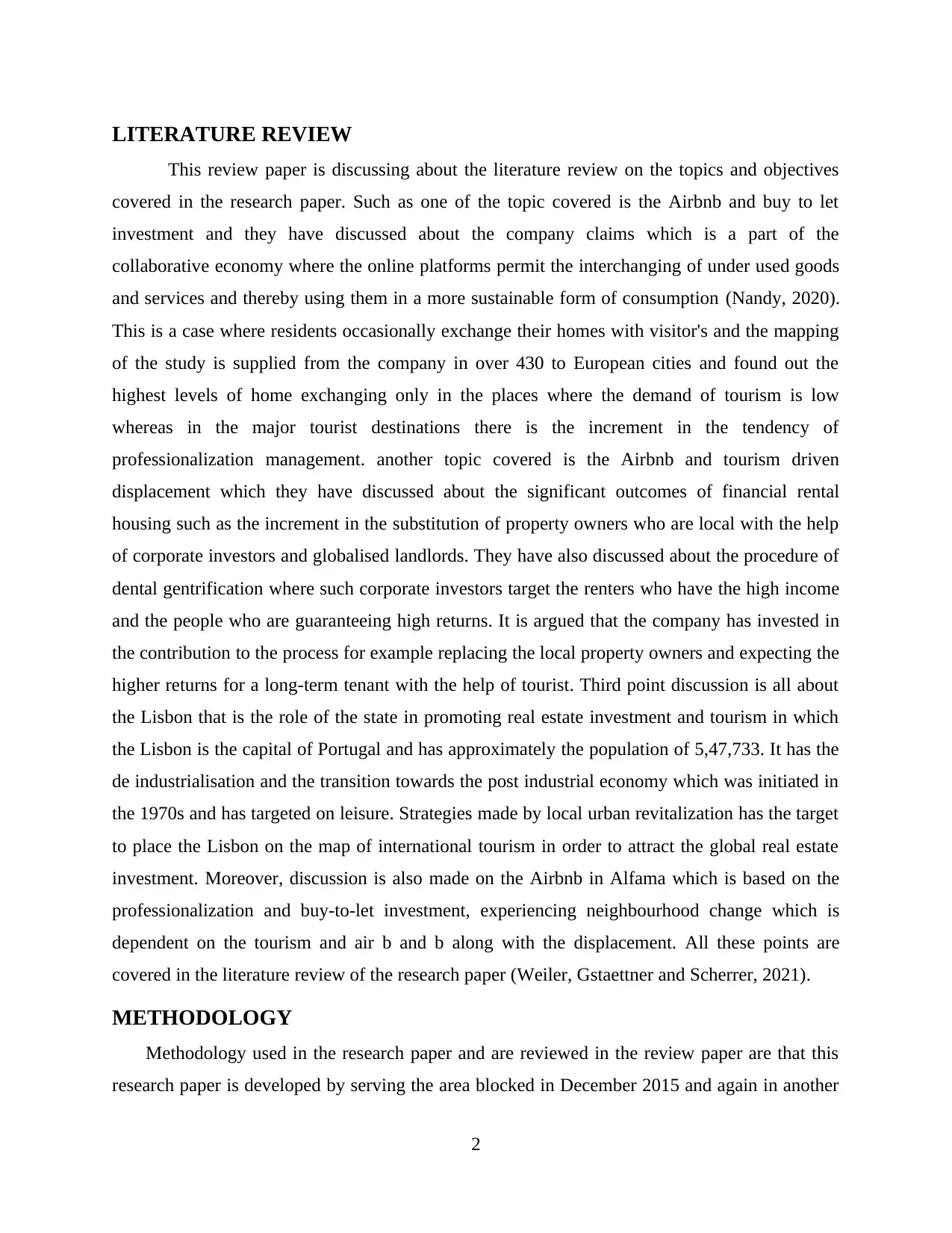
LITERATURE REVIEW
This review paper is discussing about the literature review on the topics and objectives
covered in the research paper. Such as one of the topic covered is the Airbnb and buy to let
investment and they have discussed about the company claims which is a part of the
collaborative economy where the online platforms permit the interchanging of under used goods
and services and thereby using them in a more sustainable form of consumption (Nandy, 2020).
This is a case where residents occasionally exchange their homes with visitor's and the mapping
of the study is supplied from the company in over 430 to European cities and found out the
highest levels of home exchanging only in the places where the demand of tourism is low
whereas in the major tourist destinations there is the increment in the tendency of
professionalization management. another topic covered is the Airbnb and tourism driven
displacement which they have discussed about the significant outcomes of financial rental
housing such as the increment in the substitution of property owners who are local with the help
of corporate investors and globalised landlords. They have also discussed about the procedure of
dental gentrification where such corporate investors target the renters who have the high income
and the people who are guaranteeing high returns. It is argued that the company has invested in
the contribution to the process for example replacing the local property owners and expecting the
higher returns for a long-term tenant with the help of tourist. Third point discussion is all about
the Lisbon that is the role of the state in promoting real estate investment and tourism in which
the Lisbon is the capital of Portugal and has approximately the population of 5,47,733. It has the
de industrialisation and the transition towards the post industrial economy which was initiated in
the 1970s and has targeted on leisure. Strategies made by local urban revitalization has the target
to place the Lisbon on the map of international tourism in order to attract the global real estate
investment. Moreover, discussion is also made on the Airbnb in Alfama which is based on the
professionalization and buy-to-let investment, experiencing neighbourhood change which is
dependent on the tourism and air b and b along with the displacement. All these points are
covered in the literature review of the research paper (Weiler, Gstaettner and Scherrer, 2021).
METHODOLOGY
Methodology used in the research paper and are reviewed in the review paper are that this
research paper is developed by serving the area blocked in December 2015 and again in another
2
This review paper is discussing about the literature review on the topics and objectives
covered in the research paper. Such as one of the topic covered is the Airbnb and buy to let
investment and they have discussed about the company claims which is a part of the
collaborative economy where the online platforms permit the interchanging of under used goods
and services and thereby using them in a more sustainable form of consumption (Nandy, 2020).
This is a case where residents occasionally exchange their homes with visitor's and the mapping
of the study is supplied from the company in over 430 to European cities and found out the
highest levels of home exchanging only in the places where the demand of tourism is low
whereas in the major tourist destinations there is the increment in the tendency of
professionalization management. another topic covered is the Airbnb and tourism driven
displacement which they have discussed about the significant outcomes of financial rental
housing such as the increment in the substitution of property owners who are local with the help
of corporate investors and globalised landlords. They have also discussed about the procedure of
dental gentrification where such corporate investors target the renters who have the high income
and the people who are guaranteeing high returns. It is argued that the company has invested in
the contribution to the process for example replacing the local property owners and expecting the
higher returns for a long-term tenant with the help of tourist. Third point discussion is all about
the Lisbon that is the role of the state in promoting real estate investment and tourism in which
the Lisbon is the capital of Portugal and has approximately the population of 5,47,733. It has the
de industrialisation and the transition towards the post industrial economy which was initiated in
the 1970s and has targeted on leisure. Strategies made by local urban revitalization has the target
to place the Lisbon on the map of international tourism in order to attract the global real estate
investment. Moreover, discussion is also made on the Airbnb in Alfama which is based on the
professionalization and buy-to-let investment, experiencing neighbourhood change which is
dependent on the tourism and air b and b along with the displacement. All these points are
covered in the literature review of the research paper (Weiler, Gstaettner and Scherrer, 2021).
METHODOLOGY
Methodology used in the research paper and are reviewed in the review paper are that this
research paper is developed by serving the area blocked in December 2015 and again in another
2
⊘ This is a preview!⊘
Do you want full access?
Subscribe today to unlock all pages.

Trusted by 1+ million students worldwide
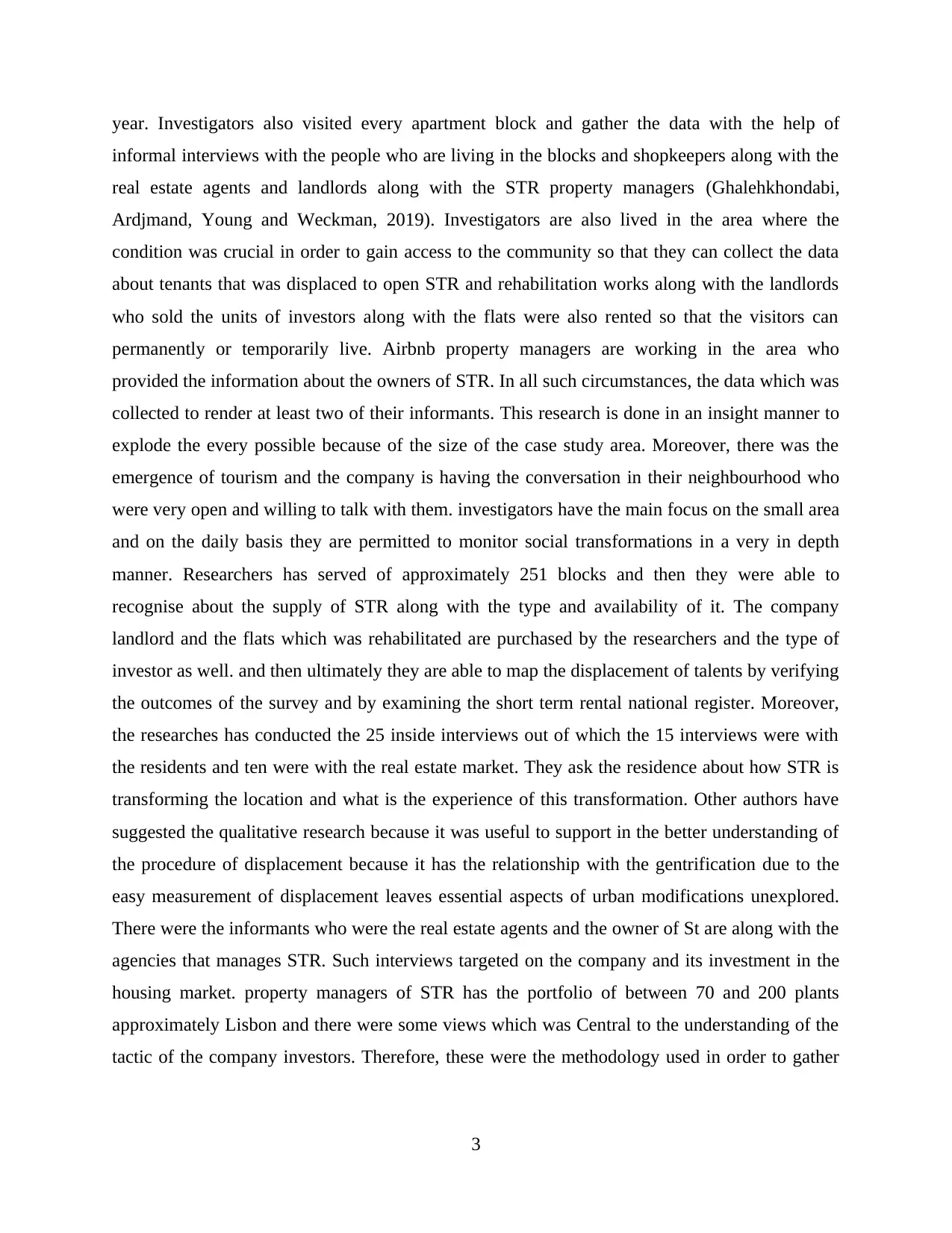
year. Investigators also visited every apartment block and gather the data with the help of
informal interviews with the people who are living in the blocks and shopkeepers along with the
real estate agents and landlords along with the STR property managers (Ghalehkhondabi,
Ardjmand, Young and Weckman, 2019). Investigators are also lived in the area where the
condition was crucial in order to gain access to the community so that they can collect the data
about tenants that was displaced to open STR and rehabilitation works along with the landlords
who sold the units of investors along with the flats were also rented so that the visitors can
permanently or temporarily live. Airbnb property managers are working in the area who
provided the information about the owners of STR. In all such circumstances, the data which was
collected to render at least two of their informants. This research is done in an insight manner to
explode the every possible because of the size of the case study area. Moreover, there was the
emergence of tourism and the company is having the conversation in their neighbourhood who
were very open and willing to talk with them. investigators have the main focus on the small area
and on the daily basis they are permitted to monitor social transformations in a very in depth
manner. Researchers has served of approximately 251 blocks and then they were able to
recognise about the supply of STR along with the type and availability of it. The company
landlord and the flats which was rehabilitated are purchased by the researchers and the type of
investor as well. and then ultimately they are able to map the displacement of talents by verifying
the outcomes of the survey and by examining the short term rental national register. Moreover,
the researches has conducted the 25 inside interviews out of which the 15 interviews were with
the residents and ten were with the real estate market. They ask the residence about how STR is
transforming the location and what is the experience of this transformation. Other authors have
suggested the qualitative research because it was useful to support in the better understanding of
the procedure of displacement because it has the relationship with the gentrification due to the
easy measurement of displacement leaves essential aspects of urban modifications unexplored.
There were the informants who were the real estate agents and the owner of St are along with the
agencies that manages STR. Such interviews targeted on the company and its investment in the
housing market. property managers of STR has the portfolio of between 70 and 200 plants
approximately Lisbon and there were some views which was Central to the understanding of the
tactic of the company investors. Therefore, these were the methodology used in order to gather
3
informal interviews with the people who are living in the blocks and shopkeepers along with the
real estate agents and landlords along with the STR property managers (Ghalehkhondabi,
Ardjmand, Young and Weckman, 2019). Investigators are also lived in the area where the
condition was crucial in order to gain access to the community so that they can collect the data
about tenants that was displaced to open STR and rehabilitation works along with the landlords
who sold the units of investors along with the flats were also rented so that the visitors can
permanently or temporarily live. Airbnb property managers are working in the area who
provided the information about the owners of STR. In all such circumstances, the data which was
collected to render at least two of their informants. This research is done in an insight manner to
explode the every possible because of the size of the case study area. Moreover, there was the
emergence of tourism and the company is having the conversation in their neighbourhood who
were very open and willing to talk with them. investigators have the main focus on the small area
and on the daily basis they are permitted to monitor social transformations in a very in depth
manner. Researchers has served of approximately 251 blocks and then they were able to
recognise about the supply of STR along with the type and availability of it. The company
landlord and the flats which was rehabilitated are purchased by the researchers and the type of
investor as well. and then ultimately they are able to map the displacement of talents by verifying
the outcomes of the survey and by examining the short term rental national register. Moreover,
the researches has conducted the 25 inside interviews out of which the 15 interviews were with
the residents and ten were with the real estate market. They ask the residence about how STR is
transforming the location and what is the experience of this transformation. Other authors have
suggested the qualitative research because it was useful to support in the better understanding of
the procedure of displacement because it has the relationship with the gentrification due to the
easy measurement of displacement leaves essential aspects of urban modifications unexplored.
There were the informants who were the real estate agents and the owner of St are along with the
agencies that manages STR. Such interviews targeted on the company and its investment in the
housing market. property managers of STR has the portfolio of between 70 and 200 plants
approximately Lisbon and there were some views which was Central to the understanding of the
tactic of the company investors. Therefore, these were the methodology used in order to gather
3
Paraphrase This Document
Need a fresh take? Get an instant paraphrase of this document with our AI Paraphraser
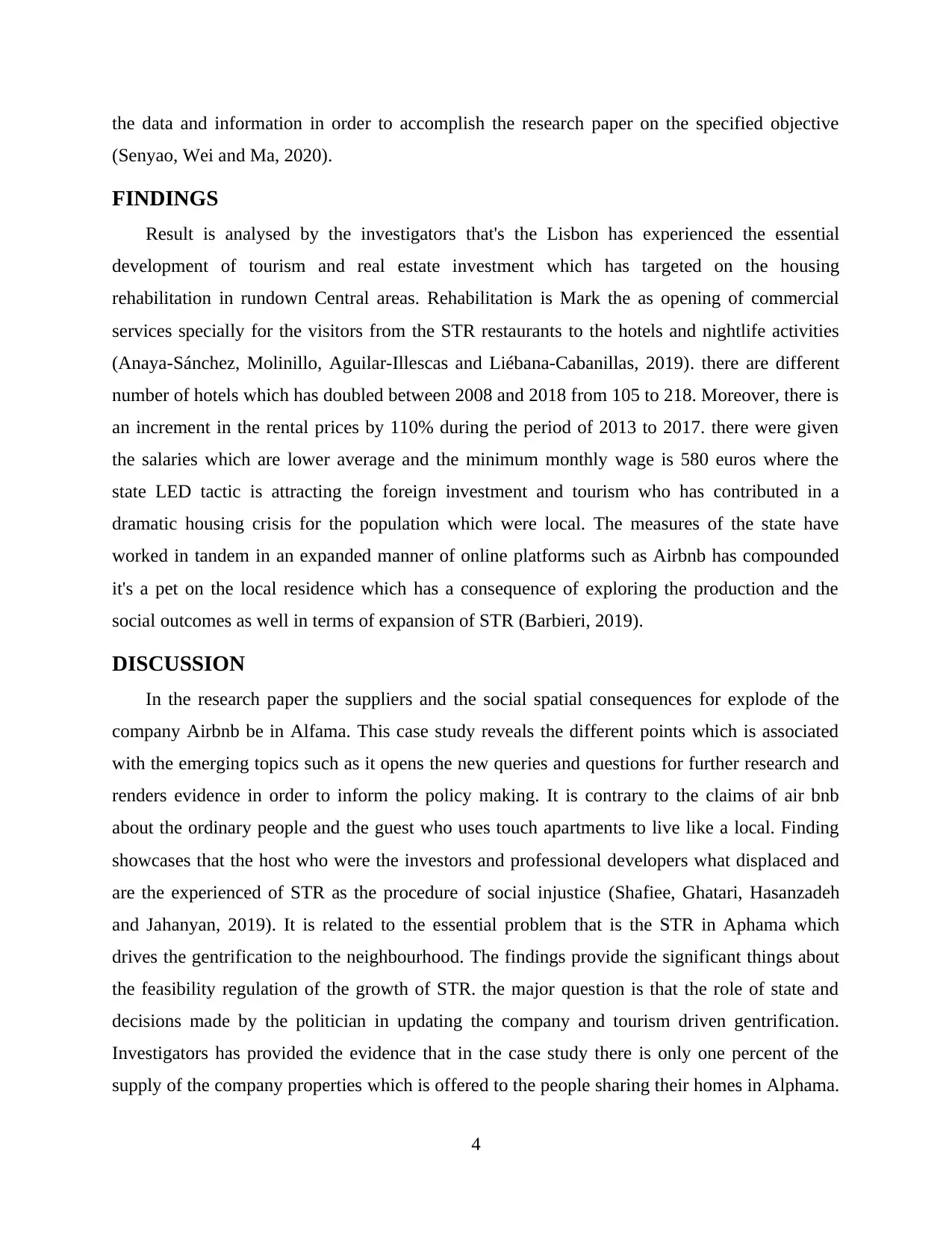
the data and information in order to accomplish the research paper on the specified objective
(Senyao, Wei and Ma, 2020).
FINDINGS
Result is analysed by the investigators that's the Lisbon has experienced the essential
development of tourism and real estate investment which has targeted on the housing
rehabilitation in rundown Central areas. Rehabilitation is Mark the as opening of commercial
services specially for the visitors from the STR restaurants to the hotels and nightlife activities
(Anaya-Sánchez, Molinillo, Aguilar-Illescas and Liébana-Cabanillas, 2019). there are different
number of hotels which has doubled between 2008 and 2018 from 105 to 218. Moreover, there is
an increment in the rental prices by 110% during the period of 2013 to 2017. there were given
the salaries which are lower average and the minimum monthly wage is 580 euros where the
state LED tactic is attracting the foreign investment and tourism who has contributed in a
dramatic housing crisis for the population which were local. The measures of the state have
worked in tandem in an expanded manner of online platforms such as Airbnb has compounded
it's a pet on the local residence which has a consequence of exploring the production and the
social outcomes as well in terms of expansion of STR (Barbieri, 2019).
DISCUSSION
In the research paper the suppliers and the social spatial consequences for explode of the
company Airbnb be in Alfama. This case study reveals the different points which is associated
with the emerging topics such as it opens the new queries and questions for further research and
renders evidence in order to inform the policy making. It is contrary to the claims of air bnb
about the ordinary people and the guest who uses touch apartments to live like a local. Finding
showcases that the host who were the investors and professional developers what displaced and
are the experienced of STR as the procedure of social injustice (Shafiee, Ghatari, Hasanzadeh
and Jahanyan, 2019). It is related to the essential problem that is the STR in Aphama which
drives the gentrification to the neighbourhood. The findings provide the significant things about
the feasibility regulation of the growth of STR. the major question is that the role of state and
decisions made by the politician in updating the company and tourism driven gentrification.
Investigators has provided the evidence that in the case study there is only one percent of the
supply of the company properties which is offered to the people sharing their homes in Alphama.
4
(Senyao, Wei and Ma, 2020).
FINDINGS
Result is analysed by the investigators that's the Lisbon has experienced the essential
development of tourism and real estate investment which has targeted on the housing
rehabilitation in rundown Central areas. Rehabilitation is Mark the as opening of commercial
services specially for the visitors from the STR restaurants to the hotels and nightlife activities
(Anaya-Sánchez, Molinillo, Aguilar-Illescas and Liébana-Cabanillas, 2019). there are different
number of hotels which has doubled between 2008 and 2018 from 105 to 218. Moreover, there is
an increment in the rental prices by 110% during the period of 2013 to 2017. there were given
the salaries which are lower average and the minimum monthly wage is 580 euros where the
state LED tactic is attracting the foreign investment and tourism who has contributed in a
dramatic housing crisis for the population which were local. The measures of the state have
worked in tandem in an expanded manner of online platforms such as Airbnb has compounded
it's a pet on the local residence which has a consequence of exploring the production and the
social outcomes as well in terms of expansion of STR (Barbieri, 2019).
DISCUSSION
In the research paper the suppliers and the social spatial consequences for explode of the
company Airbnb be in Alfama. This case study reveals the different points which is associated
with the emerging topics such as it opens the new queries and questions for further research and
renders evidence in order to inform the policy making. It is contrary to the claims of air bnb
about the ordinary people and the guest who uses touch apartments to live like a local. Finding
showcases that the host who were the investors and professional developers what displaced and
are the experienced of STR as the procedure of social injustice (Shafiee, Ghatari, Hasanzadeh
and Jahanyan, 2019). It is related to the essential problem that is the STR in Aphama which
drives the gentrification to the neighbourhood. The findings provide the significant things about
the feasibility regulation of the growth of STR. the major question is that the role of state and
decisions made by the politician in updating the company and tourism driven gentrification.
Investigators has provided the evidence that in the case study there is only one percent of the
supply of the company properties which is offered to the people sharing their homes in Alphama.
4
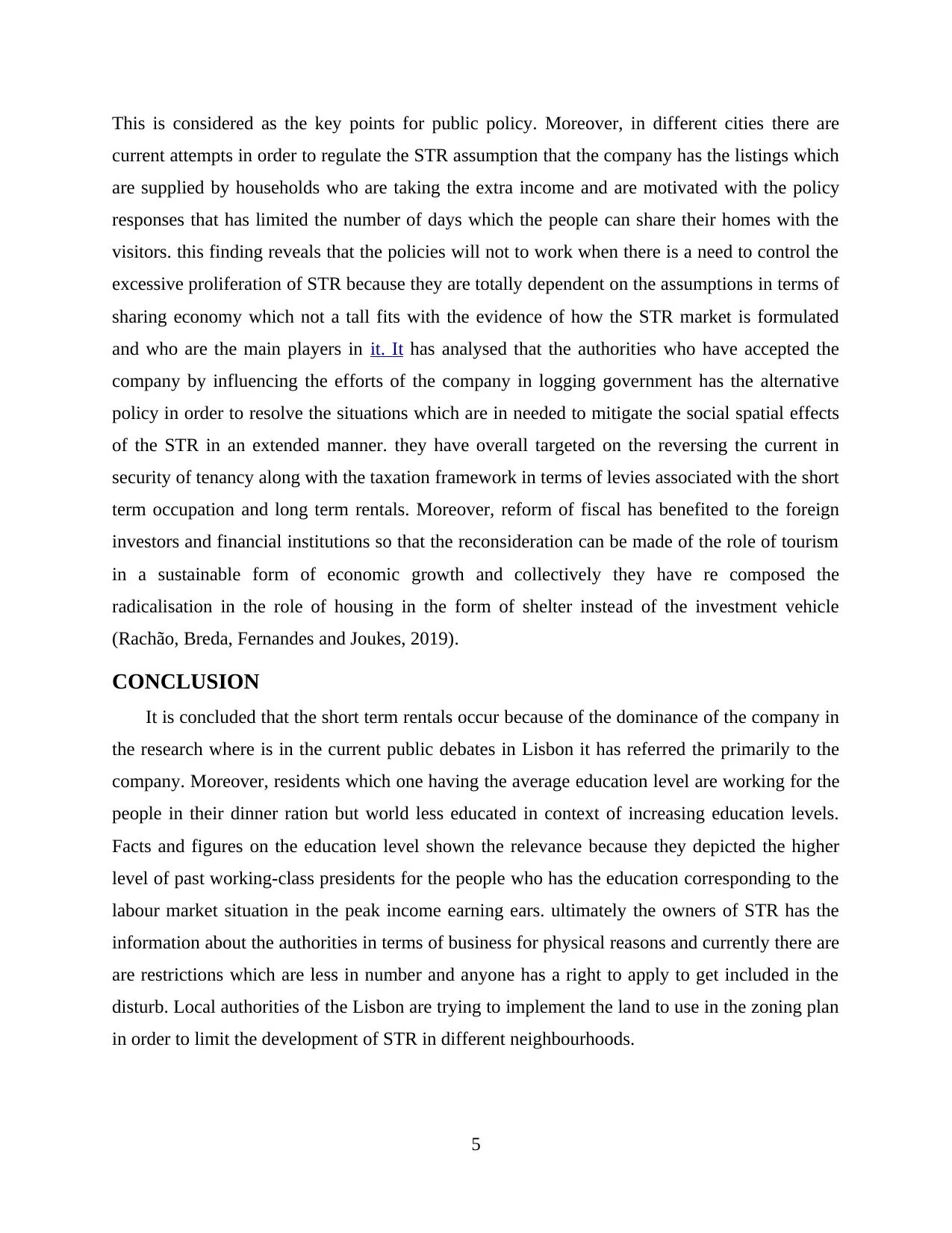
This is considered as the key points for public policy. Moreover, in different cities there are
current attempts in order to regulate the STR assumption that the company has the listings which
are supplied by households who are taking the extra income and are motivated with the policy
responses that has limited the number of days which the people can share their homes with the
visitors. this finding reveals that the policies will not to work when there is a need to control the
excessive proliferation of STR because they are totally dependent on the assumptions in terms of
sharing economy which not a tall fits with the evidence of how the STR market is formulated
and who are the main players in it. It has analysed that the authorities who have accepted the
company by influencing the efforts of the company in logging government has the alternative
policy in order to resolve the situations which are in needed to mitigate the social spatial effects
of the STR in an extended manner. they have overall targeted on the reversing the current in
security of tenancy along with the taxation framework in terms of levies associated with the short
term occupation and long term rentals. Moreover, reform of fiscal has benefited to the foreign
investors and financial institutions so that the reconsideration can be made of the role of tourism
in a sustainable form of economic growth and collectively they have re composed the
radicalisation in the role of housing in the form of shelter instead of the investment vehicle
(Rachão, Breda, Fernandes and Joukes, 2019).
CONCLUSION
It is concluded that the short term rentals occur because of the dominance of the company in
the research where is in the current public debates in Lisbon it has referred the primarily to the
company. Moreover, residents which one having the average education level are working for the
people in their dinner ration but world less educated in context of increasing education levels.
Facts and figures on the education level shown the relevance because they depicted the higher
level of past working-class presidents for the people who has the education corresponding to the
labour market situation in the peak income earning ears. ultimately the owners of STR has the
information about the authorities in terms of business for physical reasons and currently there are
are restrictions which are less in number and anyone has a right to apply to get included in the
disturb. Local authorities of the Lisbon are trying to implement the land to use in the zoning plan
in order to limit the development of STR in different neighbourhoods.
5
current attempts in order to regulate the STR assumption that the company has the listings which
are supplied by households who are taking the extra income and are motivated with the policy
responses that has limited the number of days which the people can share their homes with the
visitors. this finding reveals that the policies will not to work when there is a need to control the
excessive proliferation of STR because they are totally dependent on the assumptions in terms of
sharing economy which not a tall fits with the evidence of how the STR market is formulated
and who are the main players in it. It has analysed that the authorities who have accepted the
company by influencing the efforts of the company in logging government has the alternative
policy in order to resolve the situations which are in needed to mitigate the social spatial effects
of the STR in an extended manner. they have overall targeted on the reversing the current in
security of tenancy along with the taxation framework in terms of levies associated with the short
term occupation and long term rentals. Moreover, reform of fiscal has benefited to the foreign
investors and financial institutions so that the reconsideration can be made of the role of tourism
in a sustainable form of economic growth and collectively they have re composed the
radicalisation in the role of housing in the form of shelter instead of the investment vehicle
(Rachão, Breda, Fernandes and Joukes, 2019).
CONCLUSION
It is concluded that the short term rentals occur because of the dominance of the company in
the research where is in the current public debates in Lisbon it has referred the primarily to the
company. Moreover, residents which one having the average education level are working for the
people in their dinner ration but world less educated in context of increasing education levels.
Facts and figures on the education level shown the relevance because they depicted the higher
level of past working-class presidents for the people who has the education corresponding to the
labour market situation in the peak income earning ears. ultimately the owners of STR has the
information about the authorities in terms of business for physical reasons and currently there are
are restrictions which are less in number and anyone has a right to apply to get included in the
disturb. Local authorities of the Lisbon are trying to implement the land to use in the zoning plan
in order to limit the development of STR in different neighbourhoods.
5
⊘ This is a preview!⊘
Do you want full access?
Subscribe today to unlock all pages.

Trusted by 1+ million students worldwide
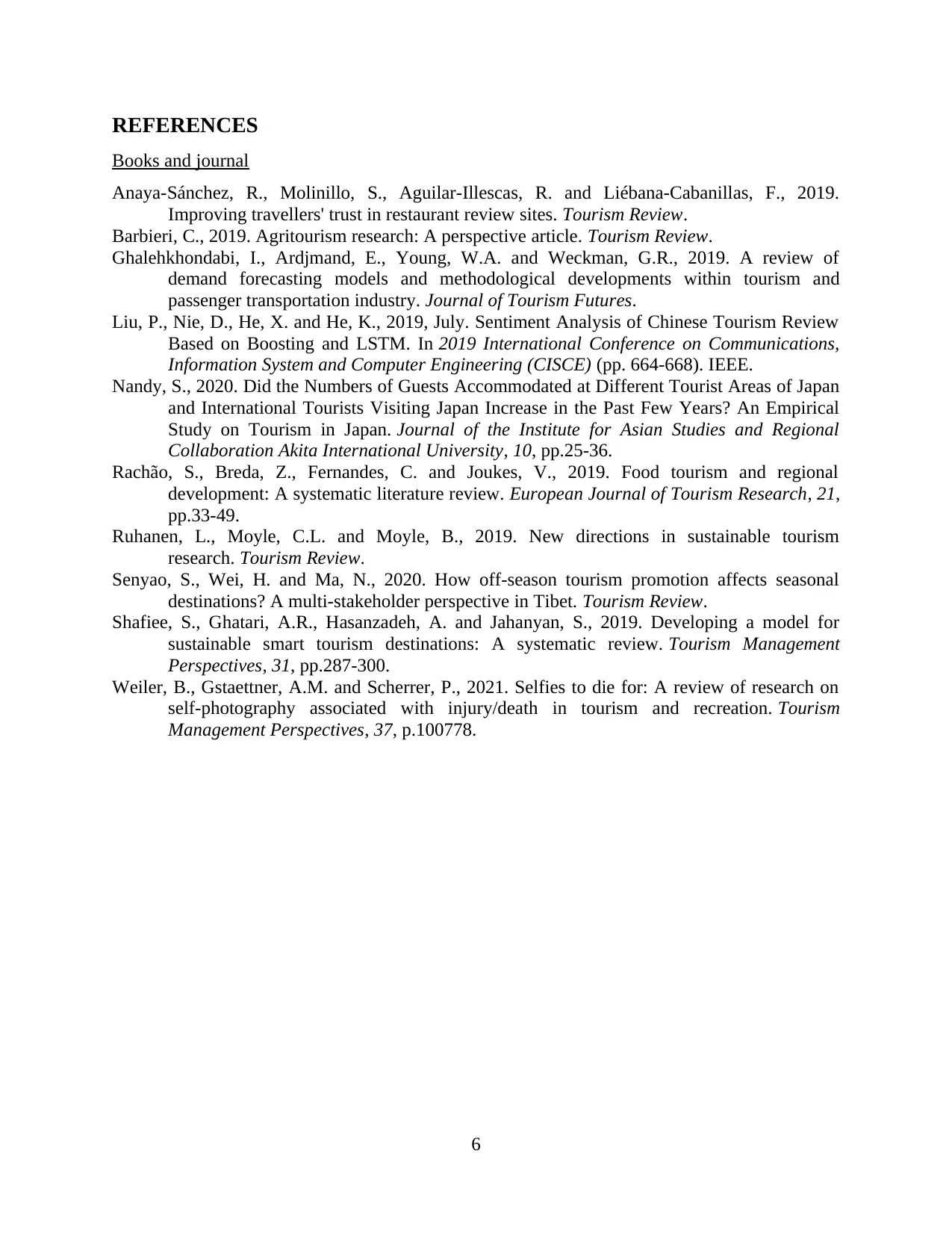
REFERENCES
Books and journal
Anaya-Sánchez, R., Molinillo, S., Aguilar-Illescas, R. and Liébana-Cabanillas, F., 2019.
Improving travellers' trust in restaurant review sites. Tourism Review.
Barbieri, C., 2019. Agritourism research: A perspective article. Tourism Review.
Ghalehkhondabi, I., Ardjmand, E., Young, W.A. and Weckman, G.R., 2019. A review of
demand forecasting models and methodological developments within tourism and
passenger transportation industry. Journal of Tourism Futures.
Liu, P., Nie, D., He, X. and He, K., 2019, July. Sentiment Analysis of Chinese Tourism Review
Based on Boosting and LSTM. In 2019 International Conference on Communications,
Information System and Computer Engineering (CISCE) (pp. 664-668). IEEE.
Nandy, S., 2020. Did the Numbers of Guests Accommodated at Different Tourist Areas of Japan
and International Tourists Visiting Japan Increase in the Past Few Years? An Empirical
Study on Tourism in Japan. Journal of the Institute for Asian Studies and Regional
Collaboration Akita International University, 10, pp.25-36.
Rachão, S., Breda, Z., Fernandes, C. and Joukes, V., 2019. Food tourism and regional
development: A systematic literature review. European Journal of Tourism Research, 21,
pp.33-49.
Ruhanen, L., Moyle, C.L. and Moyle, B., 2019. New directions in sustainable tourism
research. Tourism Review.
Senyao, S., Wei, H. and Ma, N., 2020. How off-season tourism promotion affects seasonal
destinations? A multi-stakeholder perspective in Tibet. Tourism Review.
Shafiee, S., Ghatari, A.R., Hasanzadeh, A. and Jahanyan, S., 2019. Developing a model for
sustainable smart tourism destinations: A systematic review. Tourism Management
Perspectives, 31, pp.287-300.
Weiler, B., Gstaettner, A.M. and Scherrer, P., 2021. Selfies to die for: A review of research on
self-photography associated with injury/death in tourism and recreation. Tourism
Management Perspectives, 37, p.100778.
6
Books and journal
Anaya-Sánchez, R., Molinillo, S., Aguilar-Illescas, R. and Liébana-Cabanillas, F., 2019.
Improving travellers' trust in restaurant review sites. Tourism Review.
Barbieri, C., 2019. Agritourism research: A perspective article. Tourism Review.
Ghalehkhondabi, I., Ardjmand, E., Young, W.A. and Weckman, G.R., 2019. A review of
demand forecasting models and methodological developments within tourism and
passenger transportation industry. Journal of Tourism Futures.
Liu, P., Nie, D., He, X. and He, K., 2019, July. Sentiment Analysis of Chinese Tourism Review
Based on Boosting and LSTM. In 2019 International Conference on Communications,
Information System and Computer Engineering (CISCE) (pp. 664-668). IEEE.
Nandy, S., 2020. Did the Numbers of Guests Accommodated at Different Tourist Areas of Japan
and International Tourists Visiting Japan Increase in the Past Few Years? An Empirical
Study on Tourism in Japan. Journal of the Institute for Asian Studies and Regional
Collaboration Akita International University, 10, pp.25-36.
Rachão, S., Breda, Z., Fernandes, C. and Joukes, V., 2019. Food tourism and regional
development: A systematic literature review. European Journal of Tourism Research, 21,
pp.33-49.
Ruhanen, L., Moyle, C.L. and Moyle, B., 2019. New directions in sustainable tourism
research. Tourism Review.
Senyao, S., Wei, H. and Ma, N., 2020. How off-season tourism promotion affects seasonal
destinations? A multi-stakeholder perspective in Tibet. Tourism Review.
Shafiee, S., Ghatari, A.R., Hasanzadeh, A. and Jahanyan, S., 2019. Developing a model for
sustainable smart tourism destinations: A systematic review. Tourism Management
Perspectives, 31, pp.287-300.
Weiler, B., Gstaettner, A.M. and Scherrer, P., 2021. Selfies to die for: A review of research on
self-photography associated with injury/death in tourism and recreation. Tourism
Management Perspectives, 37, p.100778.
6
1 out of 10
Your All-in-One AI-Powered Toolkit for Academic Success.
+13062052269
info@desklib.com
Available 24*7 on WhatsApp / Email
![[object Object]](/_next/static/media/star-bottom.7253800d.svg)
Unlock your academic potential
Copyright © 2020–2026 A2Z Services. All Rights Reserved. Developed and managed by ZUCOL.

